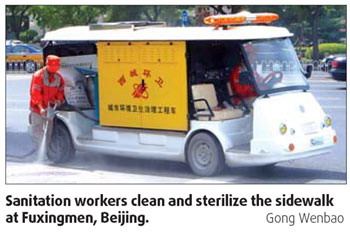The Beijing Environment Sanitation Engineering Company has dispatched more than one-fourth of its 6,500 workers to work in the areas around the Olympic venues to ensure a clean environment.
"I feel enormously gratified when I see a clean and beautiful Olympic district as a result of our work," Li said. "And I am quite sure the city will remain as beautiful as it is after the Olympics."
Li currently gets up at 5:30 every morning and works deep into the night. The company provides each worker with two uniforms and free box meals during their work hours.
"The Olympic Games is definitely a big impetus for us to improve our work," Wang Weijie, a manager with the company, said.
The company dispatched 187 pieces of sanitation equipment of various types, including an advanced multi-functional street-cleaning vehicle imported from Sweden, to the Olympic areas, Wang said.

Two small vehicles for removing chewing gum on the ground have already been put into use, saving a lot of labor, Wang said. Workers used to have to squat on their heels to manually remove chewing gum.
"Our workers are expected to pick up rubbish thrown on the ground as quickly as possible, maybe in several seconds," she said.
The biggest challenge comes with the huge number of spectators during the games.
"People are still not completely aware of protecting the environment," she said, "so we anticipated that there would be lots of rubbish thrown on the ground. "
However, Wang is certain that Beijing will remain clean and sanitary after the Olympic Games because a revolution has occurred in treating rubbish.
"We have abandoned the old simple way of treating rubbish and adopted the 3 R's of reduction, reuse and recycle," she said.
In the past, most rubbish was buried in suburban landfills with little treatment, causing serious contamination of the surrounding environment and ground water.
Today, only 30 percent of the rubbish is buried; 40 percent is used to generate electricity and 30 percent is processed and turned into fertilizer.
Before it is buried, the rubbish is treated with advanced technology so that it won't harm the environment.
According to the Beijing municipal administration, of the 108 tons of rubbish collected after the opening ceremony of the Beijing Olympics, 91 tons were retrieved and reused.
As the living standard has improved, so has the amount of rubbish produced by Beijingers on a daily basis. The city is expected to complete four waste treatment plants capable of treating 1,200 tons of food waste by the end of the year.
On July 25, China's first selective rubbish sorting assembly line using near-infrared spectroscopy (NIRS) technology was opened in the Yiqing Branch of the Beijing Environment Sanitation Engineering Company.
The line can sort out plastic bottles, plastic bags, PVC pipes, iron and paper, and has a daily capacity of treating 150 tons of rubbish, an equivalent of the workload of 80 workers, according to Dong Li, Vice Manager of the branch.
A single bag of garbage can be sorted in five minutes, he said. The line was first used in treating rubbish from Olympic venues, Dong said.
Li Chunguo certainly has no regrets about the decision he made in coming to Beijing in 1989 when the company recruited him. He was freshly discharged from military service and came a few days after his wedding with the full support of his new wife.
He still remembers what she told him. "She said: 'Do your best in Beijing and don't worry, I'll take care of your parents'," he recalled. "I was very moved," he added.
Li's wife now works for an insurance company in Beijing. The couple has a son in high school in Chengde because as migrants, they have no hukou or official residency in Beijing. The boy will have to take the college entrance exam in Hebei.
"I definitely want him to go to college," his father said. "I want him to have a good future."